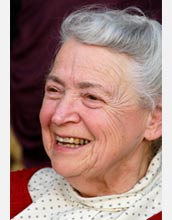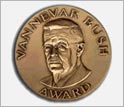|

Press Release 09-040
Millie Dresselhaus to Receive 2009 Vannevar Bush Award

Queen of Carbon Science bestowed honor by the National Science Board; ceremony takes place May 13
March 9, 2009
Once dubbed the "Queen of Carbon Science" as one of the nation's foremost experts in the multifaceted field of carbon science, longtime Massachusetts Institute of Technology (MIT) Institute Professor Mildred Dresselhaus has been named the National Science Board's 2009 Vannevar Bush Awardee. "Every morning before 6 a.m. for the past 40 years when I arrive at work, I pass a massive photograph of Vannevar Bush at his milling machine," said Dresselhaus, whose office is in the Vannevar Bush building at MIT. "When I see his smiling face, I get charged up for my day's adventure with the endless frontier of science and for my work with students and collaborators worldwide who will be enjoying the excitement of my adventures with me." Each year, the National Science Board (NSB) presents the Vannevar Bush Award to an individual who, through public service activities in science and technology, has made an outstanding "contribution toward the welfare of mankind and the nation." The NSB will honor Dresselhaus for her leadership through public service in science and engineering, her perseverance and advocacy in increasing opportunities for women in science, and for her extraordinary contributions in the field of condensed-matter physics and nanoscience. Born Mildred Spiewak and raised in an impoverished household in the Bronx, Mildred Dresselhaus beat the odds by receiving a high quality education, joining the faculty at MIT in 1968, when women comprised just 4 percent of the student population and becoming a pioneer in the field of condensed matter and materials physics. Today, the percentage of women at MIT is 40 percent, and Dresselhaus holds the title of Institute Professor, the highest honor the university bestows on its faculty (she was the first woman to receive this title). Over the course of her career, Dresselhaus' research has covered a wide range of topics in condensed matter and materials physics. She is best known for her work on carbon science and carbon nanostructures, and is also credited for being one of the researchers who caused the resurgence of the thermoelectrics research field 15 years ago by moving the field in the direction of nanostructures. Her investigations into superconductivity, the electronic properties of carbon, thermoelectricity and the new physics at the nanometer scale have led to numerous scientific discoveries. She served as president of the American Physical Society, president of the American Association for the Advancement of Science, and treasurer of the National Academy of Science, the Academy's first woman officer. In 1970, she co-founded the Women's Forum at MIT. In addition, she has been the doctorate supervisor of about 75 graduate students, and has had a special interest throughout her career in mentoring young people and in expanding the opportunities for women in science and engineering. NSB members agreed that Dresselhaus is especially deserving of the Vannevar Bush Award for her outstanding contributions to both her scientific field and to the scientific community at large. She has received the National Medal of Science; the Buckley Prize for Condensed Matter Physics from the American Physical Society; the L'Oreal-UNESCO North American Laureate for Women in Science; the Founders Medal of the IEEE; the Heinz Award for Technology, the Economy, and Employment; the Oersted Medal for Physics Education from the American Association for Physics Teachers; and 25 honorary doctorates worldwide. "We feel that the Vannevar Bush Award is an excellent and appropriate addition to this list," said NSB Chairman, Steven Beering. Dresselhaus received her undergraduate education at Hunter College. After a year at Cambridge and another at Harvard, she completed her doctorate at the University of Chicago. Her thesis in 1958 explored the subject of microwave properties of superconductors in a magnetic field that could not be explained by the BCS fundamental theory of superconductivity, which came in 1957, many years after the discovery of superconductivity (1911). Following her doctoral studies, Dresselhaus spent two years at Cornell as an NSF postdoctoral fellow, and then seven years as a staff member of the MIT Lincoln Laboratory in the Solid State Physics Division. She joined the MIT faculty in the Department of Electrical Engineering and Computer Science in 1967, and the Department of Physics in 1983, and was named an institute professor in 1985. She served as the director of the Office of Science at the U.S. Department of Energy from 2000 to 2001, and as the chair of the Governing Board of the American Institute of Physics from 2003 to 2008. Dresselhaus will receive the Vannevar Bush medal at a black-tie dinner and ceremony on May 13, 2009, at the U.S. Department of State in Washington, along with recipients of the 2009 NSB Public Service Award, Roald Hoffmann of Cornell University and the American Chemical Society's Project SEED. NSF's Alan T. Waterman Awardee David Charbonneau of Harvard University will also be honored that evening. The NSB is the 25-member policymaking body for the National Science Foundation (NSF) and advisory body to the President and Congress on science and engineering issues. Drawn from universities and industry, and representing a variety of science and engineering disciplines and geographic areas, NSB members are selected for their eminence in research, education, or public service, and records of distinguished service. The NSB has 24 members that serve six-year terms. The 25th member is the NSF Director, an ex officio member of the NSB. For more background on the NSB and its current composition, visit: http://www.nsf.gov/nsb/about/index.jsp.
-NSF-

Media Contacts
Patrick Gillooly, MIT 617-258-9276 gillooly@MIT.EDU
Lisa-Joy Zgorski, NSF (703) 292-8311 lisajoy@nsf.gov
Program Contacts
Jennifer L. Richards, NSF (703) 292-4521 jlrichar@nsf.gov
Related Websites
National Science Board: www.nsf.gov/nsb
Vannevar Bush Award Information: http://www.nsf.gov/nsb/awards/bush.jsp
Mildred Dresselhaus (faculty website): /news/longurl.cfm?id=171
Segre Lecture in Physics, Mildred Dresselhaus (YouTube video): http://www.youtube.com/watch?v=oTYgq9_NCog )

The National Science Foundation (NSF) is an independent federal agency that supports fundamental research and education across all fields of science and engineering. In fiscal year (FY) 2009, its budget is $9.5 billion, which includes $3.0 billion provided through the American Recovery and Reinvestment Act. NSF funds reach all 50 states through grants to over 1,900 universities and institutions. Each year, NSF receives about 44,400 competitive requests for funding, and makes over 11,500 new funding awards. NSF also awards over $400 million in professional and service contracts yearly.
 Get News Updates by Email Get News Updates by Email
Useful NSF Web Sites:
NSF Home Page: http://www.nsf.gov
NSF News: http://www.nsf.gov/news/
For the News Media: http://www.nsf.gov/news/newsroom.jsp
Science and Engineering Statistics: http://www.nsf.gov/statistics/
Awards Searches: http://www.nsf.gov/awardsearch/
| 


